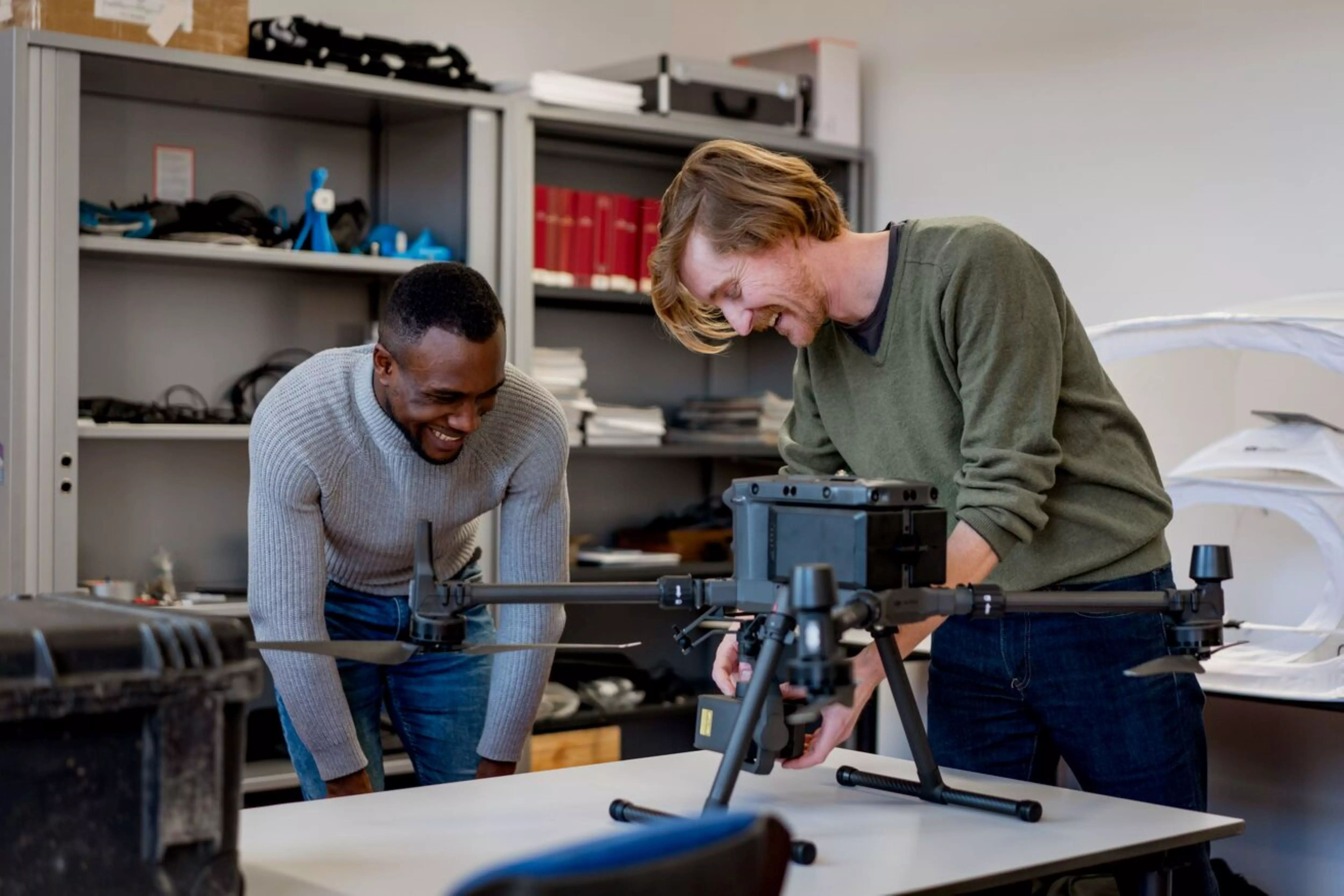
Are you enthusiastic about experimental quantum physics and a good team worker? Are you a eager to push optical atomic clocks and atom interferometers to new levels in a lively, international research group? Our Strontium Quantum Gases Group is looking for a postdoc who wants to take part in leading the new Quantum Delta NL (QDNL) Ultracold Quantum Sensing Testbed.
Postdoc in Experimental Quantum Physics
- Faculty of Science
- 14239
- PhD
- €3.378 - €5.331
- 38 hours
- Closes on31-07-2025

Are you enthusiastic about experimental quantum physics and a good team worker? Are you a eager to push optical atomic clocks and atom interferometers to new levels in a lively, international research group? Our Strontium Quantum Gases Group is looking for a postdoc who wants to take part in leading the new Quantum Delta NL (QDNL) Ultracold Quantum Sensing Testbed.
Postdoc in Experimental Quantum Physics
- Faculty of Science
- 14239
- PhD
- €3.378 - €5.331
- 38 hours
- Closes on31-07-2025
Working at the UvA
Join Us!
This postdoc position is part of the Quantum Gases & Quantum Information (QG&QI) cluster at the Institute of Physics (IoP) of the University of Amsterdam (UvA). This group is headed by Prof. Florian Schreck.
The project exploits ultracold Sr gases for quantum sensing, the study of many-body physics and for quantum computing. We are collaborating with industry, startups and users to bring optical clocks to the market and explore new ways to build sensors, such as super radiant clocks or atom interferometers based on continuous atom lasers.

Working at the UvA
Join Us!
This postdoc position is part of the Quantum Gases & Quantum Information (QG&QI) cluster at the Institute of Physics (IoP) of the University of Amsterdam (UvA). This group is headed by Prof. Florian Schreck.
The project exploits ultracold Sr gases for quantum sensing, the study of many-body physics and for quantum computing. We are collaborating with industry, startups and users to bring optical clocks to the market and explore new ways to build sensors, such as super radiant clocks or atom interferometers based on continuous atom lasers.
All about this vacancy
This is what you will do
You will be working with the QDNL KAT-3 Ultracold Quantum Sensing team, which focusses on exploiting ultracold high-flux sources of Sr for clocks and atom interferometers. We are building continuous super radiant clocks, a zero-deadtime clock and continuous atom lasers. Together with partners we are building an optical time and frequency distribution network across the Netherlands. We are collaborating with industry, startups and ESA to render ultracold atom devices more compact, robust and cheaper.
Tasks and responsibilities:
- conducting research in ultracold quantum sensing, resulting in academic publications in peer-reviewed international journals;
- actively contributing to and developing national and international research and industry partnerships and other forms of cooperation;
- representing our group at workshops, conferences, research schools, etc.;
- contributing to outreach activities of our group;
- supervising Bachelor, Master students and co-supervising PhD students;
- supporting Florian Schreck in pursuing external funding for research;
- helping with reporting duties (e.g. writing of EU deliverable reports).
What we ask of you
- a PhD in AMO physics*, preferably obtained within the last three (3) years;
- a strong background in experimental atomic or optical physics;
- a demonstrated ability to conduct independent research;
- strong written English and verbal communication skills;
- some background in cold atom physics is desired.
*Candidates must have completed all PhD requirements by the start date of the appointment
This is what we offer you
We offer a temporary employment contract for 38 hours per week for a period of 12 months. The preferred starting date is to be discussed.
The gross monthly salary, based on 38 hours per week and dependent on relevant experience, ranges between € 3,378 to € 5,331 (scale 10).This does not include 8% holiday allowance and 8,3% year-end allowance. The UFO profile Postdoc is applicable. A favourable tax agreement, the ‘30% ruling’, may apply to non-Dutch applicants. The Collective Labour Agreement of Universities of the Netherlands is applicable.
All about this vacancy
This is what you will do
You will be working with the QDNL KAT-3 Ultracold Quantum Sensing team, which focusses on exploiting ultracold high-flux sources of Sr for clocks and atom interferometers. We are building continuous super radiant clocks, a zero-deadtime clock and continuous atom lasers. Together with partners we are building an optical time and frequency distribution network across the Netherlands. We are collaborating with industry, startups and ESA to render ultracold atom devices more compact, robust and cheaper.
Tasks and responsibilities:
- conducting research in ultracold quantum sensing, resulting in academic publications in peer-reviewed international journals;
- actively contributing to and developing national and international research and industry partnerships and other forms of cooperation;
- representing our group at workshops, conferences, research schools, etc.;
- contributing to outreach activities of our group;
- supervising Bachelor, Master students and co-supervising PhD students;
- supporting Florian Schreck in pursuing external funding for research;
- helping with reporting duties (e.g. writing of EU deliverable reports).
What we ask of you
- a PhD in AMO physics*, preferably obtained within the last three (3) years;
- a strong background in experimental atomic or optical physics;
- a demonstrated ability to conduct independent research;
- strong written English and verbal communication skills;
- some background in cold atom physics is desired.
*Candidates must have completed all PhD requirements by the start date of the appointment
This is what we offer you
We offer a temporary employment contract for 38 hours per week for a period of 12 months. The preferred starting date is to be discussed.
The gross monthly salary, based on 38 hours per week and dependent on relevant experience, ranges between € 3,378 to € 5,331 (scale 10).This does not include 8% holiday allowance and 8,3% year-end allowance. The UFO profile Postdoc is applicable. A favourable tax agreement, the ‘30% ruling’, may apply to non-Dutch applicants. The Collective Labour Agreement of Universities of the Netherlands is applicable.
Your place at the UvA
You will work in this team
The Faculty of Science has a student body of around 8,000, as well as 1,800 members of staff working in education, research or support services. Researchers and students at the Faculty of Science are fascinated by every aspect of how the world works, be it elementary particles, the birth of the universe or the functioning of the brain.
The Institute of Physics (IoP) of the University of Amsterdam is located in the centre of the Amsterdam Science Park. The IoP – as part of the Faculty of Science – is housed in a modern building with excellent labs and technical facilities. Surrounded by several national research institutes and with our partners at the Vrije Universiteit Amsterdam, the institute is part of a strong physics centre of top international standing.
Want to know more about our organisation? Read more about working at the University of Amsterdam.
More about the UvA
The University of Amsterdam is ambitious, creative and committed. An inspiration to students since 1632, a vanguard player in international science and a partner in innovation.
The University of Amsterdam is the largest university in the Netherlands, with the broadest range of courses on offer. An intellectual hub with 42,000 students, 6,000 staff and 3,000 PhD students. Connected by a culture of curiosity.
Your place at the UvA
This is where you will be working
You will work in this team
The Faculty of Science has a student body of around 8,000, as well as 1,800 members of staff working in education, research or support services. Researchers and students at the Faculty of Science are fascinated by every aspect of how the world works, be it elementary particles, the birth of the universe or the functioning of the brain.
The Institute of Physics (IoP) of the University of Amsterdam is located in the centre of the Amsterdam Science Park. The IoP – as part of the Faculty of Science – is housed in a modern building with excellent labs and technical facilities. Surrounded by several national research institutes and with our partners at the Vrije Universiteit Amsterdam, the institute is part of a strong physics centre of top international standing.
Want to know more about our organisation? Read more about working at the University of Amsterdam.
More about the UvA
The University of Amsterdam is ambitious, creative and committed. An inspiration to students since 1632, a vanguard player in international science and a partner in innovation.
The University of Amsterdam is the largest university in the Netherlands, with the broadest range of courses on offer. An intellectual hub with 42,000 students, 6,000 staff and 3,000 PhD students. Connected by a culture of curiosity.
Important to know
Your application & contact
If you feel the profile fits you, and you are interested in the job, we look forward to receiving your application. You can apply online via the apply button. We accept applications until and including 31 July 2025.
If you have any questions or require additional information, please contact:
- Florian Schreck, [email protected]
Applications should include the following information (all files besides your cv should be submitted in one single pdf file):
- a detailed CV including the months (not just years) when referring to your education and work experience;
- a letter of motivation;
- a list of publications;
- the names and email addresses of two references who can provide letters of recommendation.
A knowledge security check can be part of the selection procedure.
(for details: national knowledge security guidelines)
Diversity, Equity & Inclusion
As an employer, the UvA maintains an equal opportunities policy. We value diversity and are fully committed to being a place where everyone feels at home. We nurture inquisitive minds and perseverance and allow room for persistent questioning. With us, curiosity and creativity are the prevailing culture.
Important to know
Your application & contact
If you feel the profile fits you, and you are interested in the job, we look forward to receiving your application. You can apply online via the apply button. We accept applications until and including 31 July 2025.
If you have any questions or require additional information, please contact:
- Florian Schreck, [email protected]
Applications should include the following information (all files besides your cv should be submitted in one single pdf file):
- a detailed CV including the months (not just years) when referring to your education and work experience;
- a letter of motivation;
- a list of publications;
- the names and email addresses of two references who can provide letters of recommendation.
A knowledge security check can be part of the selection procedure.
(for details: national knowledge security guidelines)
As an employer, the UvA maintains an equal opportunities policy. We value diversity and are fully committed to being a place where everyone feels at home. We nurture inquisitive minds and perseverance and allow room for persistent questioning. With us, curiosity and creativity are the prevailing culture.
Other interesting vacancies for you
Other interesting vacancies for you

Don't miss out on your dream job!
Sign up for a job alert and you'll receive automatic updates about new and relevant vacancies.

Don't miss out on your dream job!
Sign up for a job alert and you'll receive automatic updates about new and relevant vacancies.
This website uses cookies
We, and third parties, use cookies on our website. We use cookies to ensure that our website functions properly, to store your preferences, to gain insight into visitor behavior, but also for marketing and social media purposes (showing personalized advertisements). By clicking 'Accept', you agree to the use of all cookies. In our Cookie Statement. you can read more about the cookies we use and save or change your preferences. By clicking 'Refuse' you only agree to the use of functional cookies.

